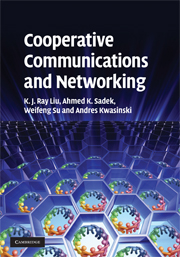Book contents
- Frontmatter
- Contents
- Preface
- Part I Background and MIMO systems
- Part II Cooperative communications
- 4 Relay channels and protocols
- 5 Cooperative communications with single relay
- 6 Multi-node cooperative communications
- 7 Distributed space–time and space–frequency coding
- 8 Relay selection: when to cooperate and with whom
- 9 Differential modulation for cooperative communications
- 10 Energy efficiency in cooperative sensor networks
- Part III Cooperative networking
- References
- Index
5 - Cooperative communications with single relay
from Part II - Cooperative communications
Published online by Cambridge University Press: 06 July 2010
- Frontmatter
- Contents
- Preface
- Part I Background and MIMO systems
- Part II Cooperative communications
- 4 Relay channels and protocols
- 5 Cooperative communications with single relay
- 6 Multi-node cooperative communications
- 7 Distributed space–time and space–frequency coding
- 8 Relay selection: when to cooperate and with whom
- 9 Differential modulation for cooperative communications
- 10 Energy efficiency in cooperative sensor networks
- Part III Cooperative networking
- References
- Index
Summary
In this chapter, we consider single relay cooperative communications in wireless networks. We focus on the discussion of symbol error rate (SER) performance analysis and optimum power allocation for uncoded cooperative communications with either an amplify-and-forward (AF) or a selective decode-and-forward (DF) cooperation protocol. In this chapter and the rest of this book, we simply call the selective DF cooperation protocol a DF protocol without confusing it with the fixed DF relaying protocol.
The chapter is organized as follows. First, we briefly describe a system model for cooperative communications with either DF or AF cooperation protocols. Second, we analyze the SER performance for DF cooperation systems, in which a closed-form SER formulation is obtained explicitly for systems with M-PSK and M-QAM modulations. An SER upper bound as well as an approximation are provided to reveal the asymptotic performance of the cooperative system. Based on the tight SER approximation, we can determine an asymptotic optimum power allocation for DF cooperation systems. Third, we consider the SER performance for AF cooperation systems, in which we first derive a simple closed-form moment-generating function (MGF) expression for the harmonic mean of two independent exponential random variables. Then, based on the simple MGF expression, closed-form SER formulations are given for AF cooperation systems with M-PSK and M-QAM modulations. We also provide a tight SER approximation to show the asymptotic performance of AF cooperation systems and to determine an optimum power allocation.
- Type
- Chapter
- Information
- Cooperative Communications and Networking , pp. 152 - 193Publisher: Cambridge University PressPrint publication year: 2008
- 1
- Cited by

